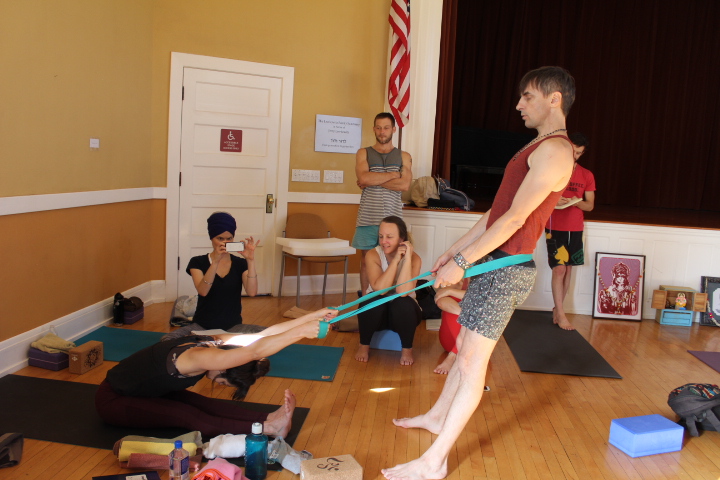
I recently overheard Joy have a conversation with a friend about me in regards to my teaching. Joy said, “David could teach me calculus and I would learn it.”
Later I asked her what she meant and she said, “You know how to teach so that a student learns. Your medium is Hatha Yoga but your gift is that you’re a teacher.” I thought about this later and wrtte down some thoughts about what I think makes an effective teacher. I’d like to share them with all of you.
The effective teacher has an ability to lead fruitful experiments in practice that can bring a new experience of yoga—this is a rare quality because it is difficult to leave familiarity and old habits behind. Learning, no matter what the subject, is something that must take in the present moment because knowledge is an ever- renewing fount that must be extracted out of the unknown. The teacher is an expert in her/his field but also walks into a class ready to teach from a position of not knowing. Receptive to spontaneity and trusting in the muse of creativity the good teacher takes chances and somehow succeeds in discovering new strategies that help the student experience her/him self through practicing postures, breathing, bandhas, and the other hatha yoga techniques. As a teacher or a student there is a positively magical quality about being able to routinely draw forth something different, relevant and meaningful out of the relentless sameness, monotony and repetition of daily practice.
The teacher knows that knowledge is not something to be dictated and enforced from outside and that the student is already in possession of their own way to walk towards truth. Therefore the teacher provides structure without being rigid, and also teaches the student to value collective rules without losing respect for individual differences. The teacher looks for whatever aspect of the subject lights the student’s fire and knows that each student has a certain built in momentum, an innate creative drive, and a unique intelligence. The teacher uses the student’s momentum to facilitate learning and help the student become stronger in forging her own independent path to yoga. The only quality or knowledge that makes the teacher a master is knowing how to empower each student.
The effective teacher also has the knack for clearing obstacles that prevent the student from finding naturalness and ease in learning. Thus the teacher initiates the student into the science of protection in practice. Strong energies are put in play in practice and the teacher must be equally strong in helping the student direct her energies in healthy, safe and fruitful directions. The teacher must have foresight, look ahead and surmise any possible negative future consequences that might come from the student's habits, actions, and efforts. Most students begin with faulty postural, movement, and thinking habits. Helping the student address entrenched habits is difficult and yet the teacher must be knowledgeable and strong enough to help the student redirect misplaced energies and misguided efforts. There is necessity to offer myriad different ways of replacing maladaptive habits with positive habits. The good teacher shows the student how every tiniest action in practice is yet another opportunity to transform unskilled action into skill in action.
Since the teacher doesn’t walk into the room with all the answers, both teacher and student, together in the moment, will come up against dead ends, obstacles, serious challenges where answers and/or solutions do not readily or easily present themselves. During these times the teacher must set an example and remain open, exploratory, receptive, humble, and empathetic-- waiting patiently and trusting that healing solutions will arrive. There will be experiments that need to be cast aside, changed, or redefined. The teacher will have to possess enough confidence in her/his abilities and trust in the power of the hatha yoga technology to continue to search for solutions to problems amidst uncertainty and changing conditions. Humility and receptivity are needed to allow for a certain around groping around in uncertainty, and to stay with the process long enough to somehow stumble upon a spark of learning that will turn into an illuminative fire of knowledge.
Comments
No comments.